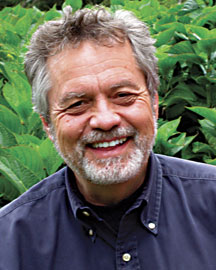|
|
|
Is Your Broccoli Robbed?
by Dave Smith • Ukiah, CA
Organics is not just about avoiding poisons; it’s also about eating well. 
Researchers in Italy found that organic peaches and pears had higher levels of the health-enhancing antioxidants ascorbic acid and polyphenol than fruits grown with poisons. Researchers at the University of California, Davis, bolstered these claims with a subsequent study, which found that organically grown corn had over 50 percent more ascorbic acid than corn grown with conventional methods.
Strawberries and marionberries (a type of blackberry) analyzed in the study had two to six times more antioxidants overall. And according to a study at Tufts University, organic produce, free of toxic chemicals, has a nutrient content approximately 88 percent greater than conventional produce.
Researchers speculate that antioxidants are part of the plants’ natural defense mechanisms, and organically grown plants have to rely more on their own defenses to fight off pests and diseases, whereas their chemically pampered counterparts do not. Once eaten, these antioxidants continue the good fight inside our bodies, fending off free radicals that cause cell damage, which can lead to cancer. The Italian researchers found that antioxidants also prevented spoilage and extended the shelf life of organically grown foods. Researchers have also found that the skins of fruits and vegetables contain the highest levels of antioxidants, whereas with conventional produce consumers often peel off the skins in order to avoid as much pesticides as possible.
Organic family farmers have loads of common sense. In this land of confusion and debate and misinformation and propaganda, they simply say: if you work with nature instead of against her you will be rewarded with health and abundance. It’s just common sense.
Buying organic is a way to make social progress with our purchasing power, to give a donation to our environment with every purchase. Sandra Steingraber recently wrote: “As well as an investment in a healthy environment for our children, directing my food dollars toward organic farmers is part of my spiritual practice.”
Think you’re looking at broccoli when browsing your local supermarket produce section? Well, it looks like broccoli and it walks like broccoli and it talks like broccoli, but it ain’t broccoli. It’s broccoli robbed...robbed of its value, its quality, its health-giving benefits, its meaning. It’s a phony. 
It seems very odd, then, that although broccoli is one of the most resistant vegetables to insect attacks, it may have been sprayed with up to seventeen different poisons, some of which are inside it and can’t be washed off. It’s been fed chemical fertilizers that may contain recycled toxic wastes. Nine metals found in fertilizers, like arsenic and lead, are known or suspected to cause cancer; metals like mercury are linked to developmental defects. And broccoli is one of the least contaminated crops we have.
By the time the broccoli gets to our supermarket, any connection to the farm it was grown on and the corporation that grew it has been lost. Who knows where it’s from or how it was treated or what is in and on it? But when we get it home, it still has some beneficial cancer-fighting, heart disease–fighting antioxidant flavo-noids left. So we pop it in the microwave, which then destroys 97 percent of the antioxidants, or we boil it, which destroys 66 percent of the antioxidants. (Steaming it destroys less than 10 percent.) If it wasn’t for shelf life, it “wouldn’t have no life at all.”
But my organic broccoli is full of meaning. Raised by the Decater family up in Covelo, California, this broccoli is delivered every week to a home in town where families enrolled in the farm’s annual program meet to pick it up. Gloria Decater unloads the truck with one of her sons, chatting away about what’s going on at the farm and what’s included in this week’s basket. I ask her how the broccoli is this week, and she says that the cater- pillars from the cabbage white butterfly are the exact same color as the broccoli stalk, almost impossible to see, but they haven’t had a problem with them this year because they planted some dill and other companion herbs to distract them from the broccoli. Some aphids appeared, but they were washed off with the hose.
My broccoli is beautiful and vibrant and full of meaning. It’s meaningful to me that Stephen and Gloria care enough about me and their farm and their family to not have poisons around. It means more work, but that’s the trade-off. It’s meaningful that Gloria and Stephen take the time to explain why the food is healthy and good in the newsletter they enclose with the basket. It’s meaningful that the person who grew the food also brought it in to town and handed it to me in a basket with a big smile. I’ve been on their farm, I know who they are. It’s not that I appreciate only that they are providers, that they are just utilitarian and of use to the community. That would be merely self-serving. Their dignity and worth lie in their character and in their humanity and in the love they bring to everything they do. That is quality that cannot be measured. That is meaning in and of itself, and my honor is in being part of a community that includes them. And that is about as close to truth and beauty and gratitude as I can get.
Excerpted from To Be of Use: The Seven Seeds of Meaningful Work © 2005, by Dave Smith. Reprinted with permission of New World Library, Novato, CA 94949. 1800 441-2100. http://www.newworldlibrary.com.
Sustainable business pioneer Dave Smith, co-founder of Smith & Hawken, is a key figure in the organic food movement. In 2004, Dave co-founded Organic Bouquet, the first national organic flower company, and is currently part of the team introducing Organic To Go, a chain of fast-food restaurants offering fast pre-made organic meals for pick-up and delivery.
|

